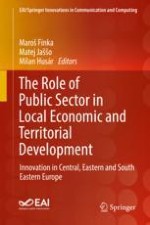2019 | OriginalPaper | Buchkapitel
2. Innovations and Changing Role of Public Sector in Spatial Development Strategies: Problems and Challenges for Local and Regional Development in Central and Eastern European Countries After 2020
verfasst von : Milan Husár, Maroš Finka, Ľubomír Jamečný, Vladimír Ondrejička
Erschienen in: The Role of Public Sector in Local Economic and Territorial Development
Aktivieren Sie unsere intelligente Suche, um passende Fachinhalte oder Patente zu finden.
Wählen Sie Textabschnitte aus um mit Künstlicher Intelligenz passenden Patente zu finden. powered by
Markieren Sie Textabschnitte, um KI-gestützt weitere passende Inhalte zu finden. powered by
